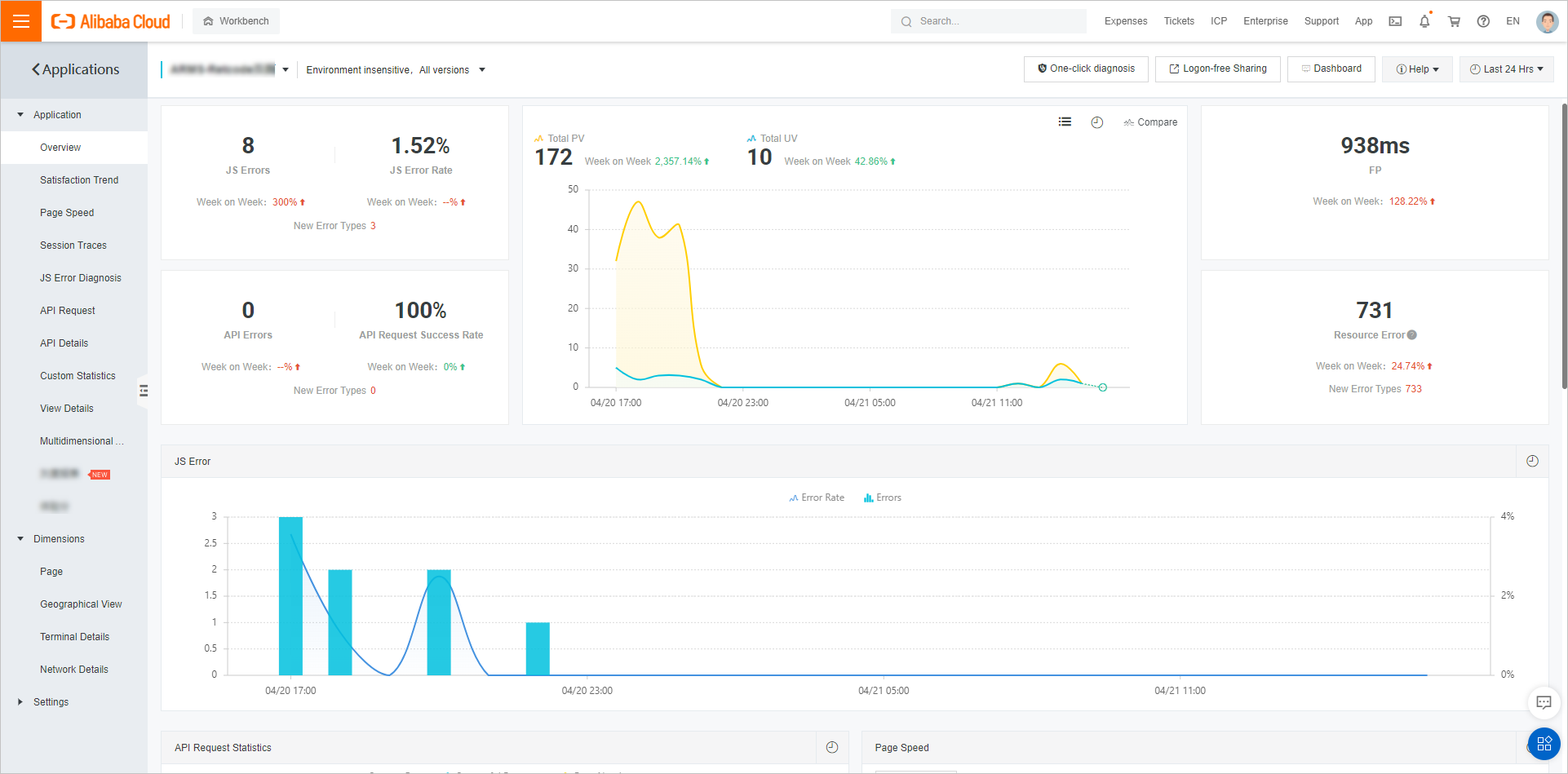ARMS RUM アプリケーションは、Web ページ監視、Weex 監視、ミニプログラム監視などのシナリオに適用できます。このアプリケーションは、ページの読み込み速度(速度テスト)、ページの安定性(JavaScript エラー)、外部サービス呼び出しの成功率(API 呼び出し)などの指標に基づいて、Web ページとミニプログラムの正常性を監視するのに役立ちます。
背景情報
ユーザーがサービスにアクセスする場合、プロセス全体は、ページ生成(サーバーの状態)、ページの読み込み、ページの実行時の 3 つのフェーズに分けることができます。
安定したオンラインサービスを確保するために、サーバーはこれらのサービスの状態を監視します。既存のサーバー監視システムは非常に成熟していますが、ページの読み込みと実行時の監視は満足のいくものではありません。次に例を示します。
ユーザーが Web サイトにアクセスしたときに発生するエラーをすぐに捕捉できません。
さまざまな国または地域からのユーザーが Web サイトにアクセスする際の実際の応答時間は不明です。
各アプリケーションの非同期データ呼び出しのパフォーマンスと成功率は不明です。
ソリューション
ARMS ブラウザ監視は、ページの読み込みと実行時の状態を監視し、データをロガーに報告します。データには、ページの読み込みパフォーマンス、実行時の例外、API 呼び出しの状態と消費時間が含まれます。次に、プラットフォームは、ARMS によって提供される豊富なリアルタイムログ分析および処理サービスに基づいて、すべての実際のオンラインユーザーのアクセスを監視します。最後に、プラットフォームは視覚的なレポートを提示して、できるだけ早く問題を検出して診断するのに役立ちます。

シナリオ
ARMS ブラウザ監視は、以下のシナリオで使用できます。
機能概要
ARMS ブラウザ監視には、豊富なブラウザ監視機能があります。このセクションでは、以下の例を示します。
ARMS ブラウザ監視は、最初のレンダリング時間、最初の画面時間、DOM Ready 時間、リソースの読み込み時間など、さまざまなページパフォーマンス指標を測定できます。
Application Real-Time Monitoring Service (ARMS) のブラウザ監視モジュールは、JavaScript (JS) エラー診断機能を提供します。JS エラーの基本情報と分布を確認し、ユーザーの行動をバックトラックできます。この機能は、エラーを特定して修正するのに役立ちます。
ARMS フロントエンド監視は、呼び出しの成功率、返された情報、成功または失敗にかかる平均時間など、アプリケーションの各 API 呼び出しの状態を提供します。
フロントエンドとバックエンドのトレース分析機能は、フロントエンドから送信された API リクエストとバックエンド呼び出し間のリンクを接続して、コード実行の完全なシーンを真に復元できます。
ブラウザとプラットフォームの互換性
ブラウザまたはプラットフォーム | サポートされているバージョン | SDK による自動データレポート | 手動データレポート |
Safari | Safari 9+ | ️️️サポートされています | ️️️サポートされています |
Chrome | Chrome 49+ | ️️️サポートされています | ️️️サポートされています |
IE | IE 9+ | ️️️サポートされています | ️️️サポートされています |
Edge | Edge 12+ | ️️️サポートされています | ️️️サポートされています |
Firefox | Firefox 36+ | ️️️サポートされています | ️️️サポートされています |
Opera | Opera 43+ | ️️️サポートされています | ️️️サポートされています |
iOS 版 Safari | iOS 9.2 以降の Safari | ️️️サポートされています | ️️️サポートされています |
Android ブラウザ | android_webkit 4.4.2+ | ️️️サポートされています | ️️️サポートされています |
Weex | Weex 0.16.0+ | サポートされていません | ️️️サポートされています |